Last edit by: serpens
What is EMV?
EMV is a standard for smart (or integrated-circuit, or chip) cards and the devices that can accept them. The standards are maintained by EMVCo and based on ISO 7816 (or ISO 14443 for contactless).
These cards come in two flavours: contact and contactless. Examples below:

----------------------------------------------------------
Notice the contactless
 indicator on the right-hand side (it looks like a sideways Wi-Fi symbol). It may also be found on the back of the card (for example, on the back of the new Costco credit card).
indicator on the right-hand side (it looks like a sideways Wi-Fi symbol). It may also be found on the back of the card (for example, on the back of the new Costco credit card).Where can I get a chip card?
Hawaiian717 operates a website with crowd-sourced information about various cards. You can adjust the search parameters to see cards with contactless, have PIN-primary authentication, etc.
Which businesses accept chip cards?
tmiw operates a website, also primarily crowd-sourced, that tracks chip-enabled merchants on a map. You can see if a merchant supports PIN, contactless, Quick Chip, et al.
Why doesn't my chip card ask for a PIN?
This is likely because you have a signature-preferring card. At this time, PIN-preferring cards issued in the US are rare. Not many financial institutions offer them; most of them instead provide Chip-and-Signature cards, which are programmed to prefer signature over PIN, if the card supports PIN at all.
What is the difference between Chip-and-Signature and Chip-and-PIN?
To the cardholder, the only major difference is how they authenticate themselves at the point of sale. The cardholder inserts their card as normal; instead of signing a screen or receipt, they will be asked to enter their PIN on the keypad.
[spoiler]
A few financial institutions issue some form of Chip-and-PIN credit cards or prepaid cards. Prepaid EMV cards however are not recommended due to junk fees.
Why no PIN? (cont.)
American debit cards are unique because they are psuedo-PIN-preferring cards. which may work at many automated kiosks. However, bear in mind the word may is used above is a context where there is no absolute certainty of success for certain environments such as automated kiosks due to different natures of offline and online transactions.
What is the difference between Chip-and-Signature and Chip-and-PIN? (cont.)
Most cards issued in the US are programmed to prefer signature, so save very few instances, they will prompt for a signature (unless the merchant sets a signature waiver). A PIN may be necessary in countries with mostly PIN-preferring cards when using unattended terminals (such as pay-at-the-pump or mass transit). If the card has a PIN for backup verification or ATMs, then that PIN should work. Otherwise, the card will be rejected. If the card is rejected, then either a.) the transaction must be performed by an attendant or b.) an alternative payment method will be required.
Some credit union issued credit cards will have this CVM (Cardholder Verification Method) as secondary if Chip-and-Signature cannot be done. Chip-and-PIN is the more prevalent method of authentication used outside the US, especially in transaction environments where no human interaction is needed (i.e. automated gas pumps, toll roads, train kiosks, etc.).
One chip can hold a lot more data, therefore it is capable of doing multiple verification methods. That's one of the great things about EMV over the mag-stripe which can hold very little data.
I want to know for sure what my EMV chip does. Is there anyway I can test out my own EMV card to see what the CVM list is?
alexmt has written up a nice step-by-step procedure on Post #3615.
If most of the EMV cards in the US is the Chip-and-Signature type, doesn't that mean it's still useless abroad?
Depends if you see it as glass half empty or glass half full. See Post #3 for further details on how Chip-and-Signature has worked both successfully and unsuccessfully depending on the merchant transaction environment and use your best judgment whether which one is right for you.
I don't want a chip in my card. I heard horror stories all over the media saying hackers can steal my credit card info from a mile away.
There are two types of chips. One is contactless and the other is contact. Cards can be either one or the other, or both.
In the Google Docs spreadsheet, the cards that are capable of contactless payments are listed seperately under the "RFID or NFC contactless chip" column. If it says yes, then that means it has the ability to do contactless payments. If it says no, it doesn't have that feature.
The one that the media has overhyped about hackers "stealing your information wirelessly" was the contactless type like this:
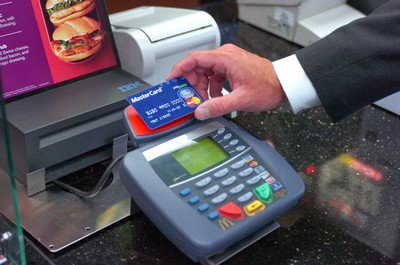
You are worried about this happening, right?
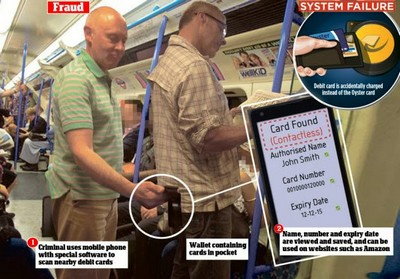
You don't have to worry. EMV is a chip standard that can have both contact and contactless interfaces. With the traditional contact interface, this means you actually have to physically insert the chip into a POS terminal for it to be authorized, like this:
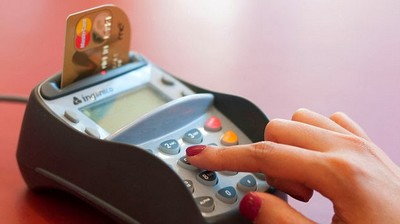
With the contact interface, nothing is wireless. No data is sent out in a stand-alone contact type EMV chip. With the EMV contactless interface, data is sent wirelessly.
Furthermore, contactless chip cards are required to show a symbol (looks like Wi-Fi symbol) somewhere on the card that to denote its capability as a contactless card. For example, here's an example of a Discover Card with contactless capability (in which Discover calls "Discover ZIP") showing the contactless symbol on the back of the card:
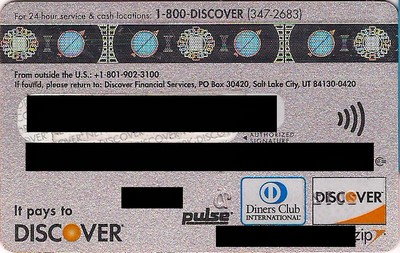
Don't believe everything that the media says. Besides, millions of people all over the world from London to Singapore, uses contactless payments daily in extremely crowded subways and mass transit with nary any problems. There are multiple layers of encrypted securities and keys that are needed to break the code.
Frankly, giving your physical card to a waiter/waitress who takes the card out of your view is much more susceptible to fraud than contactless payments.
Why should I care?
If you are an international traveler, you will want this because majority of the world has or in the process of converting to this payment format.
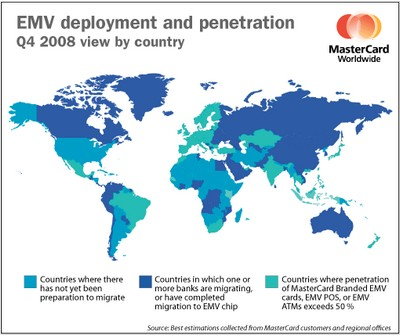
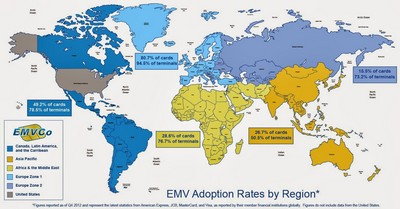
In fact, in 2012, even North Korea moved to the EMV format, leaving the US as one of the countries in the world that hasn't done so.
In addition, VISA, MC, AMEX, and Discover have all agreed to incentivize the USA shifting to EMV payments by 2015 by shifting liability for fraudulent transactions to merchants if they do not have EMV equipment and the cardholder has an EMV card. So if you travel internationally or would like to get one before the others, you might be interested in getting one.
BS! I had no problems using my card in [insert whereever country], [insert whatever point in time]
If you stick to the tourist path where they have lots of visitors from the US, you should have no problems using your mag-stripe only card in hotels and restaurants, at least for now. But as things can change as things go forward.
However, consider that once you start taking the off-beaten path, go to non-touristy places where they are not familiar with mag-stripes, rent a car and use toll roads, fill up gas, or try to buy train tickets you might end up into a trouble of the machine not recognizing your card because it lacks the chip. Furthermore, a lot of toll roads, gas pumps, and automated ticket machines lack any human assistance to help you when you need it the most.
But [insert credit card company] told me all merchants that display their logo must accept them! All I have to do is report them for violating their agreements, right?
There are several factors against this.
1. You can only speak English. The merchant representative, most likely a part-time clerk earning minimum wage, speaks in a different language, let's say French. If you have no French language skills, how are you going to get your point across? Are you going to whip out your cell phone at exorbitant int'l roaming charges and hope the customer service is going to translate it for you on the spot? Or maybe you might actually know French. But how about Swahili, Farsi, Balinese, or the multiple languages in mainland China?
2. Just like US, the rest of the world's businesses uses part-time minimum wage workers as cashiers to cut down on labor costs. Most of their SOP training manuals are written by MBA types to not to do anything they are not familiar with. Do not expect them to understand the intricate details of credit card mumbo jumbo. You don't expect Taco Bell employees to understand the minute details of Discover-JCB-Union Pay agreements, right? Same thing the other way around: be respectful as a guest in their country, prepare in advance in their ways, avoid being an "ugly American" stereotype.
3. You are a guest in their country. You are a minority. If 99.9% of their country's people and other tourists from around the world uses EMV, do you really think they are going to accomodate the 0.1% of American tourists who only have mag-stripes credit cards?
4. Again, you are a guest in their country. How would you, as an American standing in line, react if a Chinese tourist was clogging up the lines at a local Taco Bell because the clerk doesn't understand the Discover-Union Pay agreement and has trouble communicating between Mandarin spoken by the tourist and English spoken by the Taco Bell clerk? Same way the other way around. You do not want to clog up the lines for everyone. The less hassle, the better.
5. VISA and MC make tons of money from merchants in that country. Say SNCF French Rail. It's a billion dollar company in France. Do you think VISA is going to pull the plug of their relationship with SNCF because SNCF refuses to do mag-stripe processing at their unmanned train station kiosk? Of course not. Be realistic.
6. And lastly, if you're up against an unstaffed toll kiosk, gas pump or train ticket machine, are you going to yell curses at the machine?
But I want my credit card to be able to be used in the US too!
No worries. They have not gotten rid of the mag-stripe on the back of the card for backward compatibility reasons, just like we still have embossed numbers on our cards for backwards compatibility to using those old carbon copy imprinters.
[insert own Hyatt card image front and back together with red arrows pointing to all the backward compatibility features]
You use the chip on the front of the card abroad (for now), and the mag-stripe just like any other card for the US. Basically, you're increasing your credit card's acceptance rate by getting a card that both via the chip and the mag-stripe. You're getting a better deal for free.
And when 2015 comes along and US switches to EMV, you'll be way ahead of everyone else too!
So why did the rest of the world and the US moved/moving toward EMV?
Primarily, due to fraud concerns. You see, the mag-stripe has been with us since the 1950s. It may have been the most high tech thing back in the day, but with the technology that is available today, any shmo can pick up a $100 USB magnetic card skimming device off of eBay and get your credit card info.
And unlike skimming off contactless cards which actually need the person to have l33t programming skills, skimming off a magnetic stripe has become so ubiquitous that nary a day goes about skimming fraud going on somewhere in America, from gas pumps, Michael's stores (2011), Target breaches (2013), restaurant waiters/waitresses, to even McDonald's drive thrus.
https://www.google.com/search?q=skimming+fraud
These type of fraud used to be prevalent in Europe. But once they started switching over to EMV starting over 2 decades ago, this type of fraud went elsewhere. It went over to Asia, Canada and Mexico, Latin America, etc. etc. until they too began implementing EMV to combat skimming fraud. The US is practically the only country left that hasn't done so, therefore all the fraud that used to take place elsewhere is now happening here.
But EMV is old and it's not fool proof. Shouldn't we just skip over it and do something new instead?
Yes, EMV is old. It was developed in the 1990s, and its smart card payment predecessor was first introduced in France. But as of today, it has become the de-facto global standard of payments.
But then, what else is there? There is no other de facto global standard of payments alternative. For example, if we decide to skip over it and do something new, hypothetically like DNA matching technology, it still means US int'l travelers will continue to have problems abroad with useless plastic acceptance because no other country is using this DNA matching technology except the US.
Besides, nothing is fool proof. You can say that the bank vault isn't fool proof because you can crack it open if enough C4 is used. But your average low-life scumbag isn't likely to get military grade C4 easily either. But the bank vault does make it harder to get the bank's money over say a petty cash box. That's the point here. EMV is akin to a security tight bank vault, the old mag-stripe is akin to a petty cash box lying around inside the drawer.
I'm a business owner and I don't think EMV is going to take off. I'm not going to spend extra hundreds of dollars to upgrade my credit card machine. Convince me other wise why I should.
I can understand the added extra cost to your business once this switchover takes place. But before even saying that, look at your existing POS terminal. Does it have a slot somewhere to insert a card?
Most likely, if you had replaced your POS terminal within the past five years, you already have an EMV capable terminal. EMV is basically just not turned on yet from the processor and acquirer side.
If you have an EMV capable terminal, then a best bet would be to contact your acquirer to have the EMV feature turned on. You did your end of the deal already by having an EMV capable terminal, it is now the acquirers' responsibility to turn it on in accordance to the EMV switchover mandate.
And if you don't, you are going to replace your POS terminal anyway from common wear and tear. It isn't a hard switch-over. You can continue to use your POS terminal until it dies out because EMV cardholders will still have the mag-stripe on the back. And by the time your non-EMV capable POS terminal is up for replacement the market will be full with these newer POS terminals that can accept the mag-stripe, EMV, as well as contactless payments.
In addition, you may also want to check with your acquirer or processor about EMV capable terminals. Some of them are willing to replace your terminal for free in preparation for the US EMV switchover. Call and ask for details.
But what's in it for me? I'm the one that has to pay for the upgrade.
All the major card networks have given incentives for merchants for the upcoming EMV switchover.
If 75% or more of your credit card transactions are done on an EMV contact and contactless terminal, they are going to waive your annual PCI-DSS fees, which usually costs you around $5.00-$19.95/month per terminal. The overall long term cost savings of those compliance fees will be larger than the cost of an one time upgrade for the terminal.
The downside is that once EMV switchover happens and if you do not have a POS terminal that is able to accept EMV, the fraud liability shifts over to the merchant.
USA EMV cards: Availability, Q&A (Chip & PIN or Signature) [2017>]
#901
FlyerTalk Evangelist


Join Date: Aug 2001
Location: RSW
Programs: Delta - Silver; UA - Silver; HHonors - Diamond; IHG - Spire Ambassador; Marriott Bonvoy - Titanium
Posts: 14,185
I guess it's a good thing that they didn't know how to force fallback or to manually enter the card info, at least. Still, it's a big hassle for those people visiting the US (and potentially people who are traveling for work with cards like the Citi corporate card), which is why we really should just disable PIN support at the terminal level altogether if we're not going to mandate customer accessible equipment.
There's STCU too per the EMV directory I linked to above. I guess you can consider it general public...if they're in eastern Washington and Idaho, that is.
There's STCU too per the EMV directory I linked to above. I guess you can consider it general public...if they're in eastern Washington and Idaho, that is.
#902
Join Date: Jul 2007
Posts: 1,762
People are always going to complain about signature preferred...
People don't want to look like idiots when using a c and s card overseas in a PIN preferred country i.e: Canada, United Kingdom, Australia, etc.
Quite frankly I agree with these people and I don't ever cross the border.
People don't want to look like idiots when using a c and s card overseas in a PIN preferred country i.e: Canada, United Kingdom, Australia, etc.
Quite frankly I agree with these people and I don't ever cross the border.
#903
Join Date: Oct 2014
Programs: Skymiles
Posts: 3,251
The only small problem with signature preferred with pin capabilities is there might be some merchants who simply refuse to process a signature card. This was the problem we were faced with in 2012 as a number of merchants, never a large number mind you, simply refused to process magnetic strip only cards because they lacked pins. There might still be some merchants, although we don't hear of all that many here as we have this fixation with what terminal merchants use and whether or not the pin pad faces the customer. Remember even if a card has pin capabilities, if the terminal flashes the dreaded message signature required the game is over. It can't be overridden by either the customer or the merchant. Other than that possibility, if the banks have this fixation on signature, you're probably right.
On the other hand, all of my cards are now C&S, and I'm going to need to find a PIN preferred credit card to be able to test out PIN implementations. My last two cards that were Chip & PIN was USAA, which we all knew what happened with them, and a First Premier Bank which frankly is obviously a horrible horrible card.
Though I've never had it happen to me, I've heard stories of merchants flat out voiding the transaction because a signature was required even with an EMV card. The sucky part is that voids don't always reflect your available credit right away. On top of that some merchants just expect you to pretend to enter a PIN and hand you the stack of receipts without paying any attention! LOL!
Australian cards turn into C&S cards outside of Australia, I believe because of their online PIN implementation. I wonder if they face the same trouble in Europe.
#904
FlyerTalk Evangelist
Join Date: Jan 2014
Location: San Diego, CA
Programs: GE, Marriott Platinum
Posts: 15,508
On the other hand, all of my cards are now C&S, and I'm going to need to find a PIN preferred credit card to be able to test out PIN implementations. My last two cards that were Chip & PIN was USAA, which we all knew what happened with them, and a First Premier Bank which frankly is obviously a horrible horrible card.
Though I've never had it happen to me, I've heard stories of merchants flat out voiding the transaction because a signature was required even with an EMV card. The sucky part is that voids don't always reflect your available credit right away. On top of that some merchants just expect you to pretend to enter a PIN and hand you the stack of receipts without paying any attention! LOL!
Australian cards turn into C&S cards outside of Australia, I believe because of their online PIN implementation. I wonder if they face the same trouble in Europe.
Though I've never had it happen to me, I've heard stories of merchants flat out voiding the transaction because a signature was required even with an EMV card. The sucky part is that voids don't always reflect your available credit right away. On top of that some merchants just expect you to pretend to enter a PIN and hand you the stack of receipts without paying any attention! LOL!
Australian cards turn into C&S cards outside of Australia, I believe because of their online PIN implementation. I wonder if they face the same trouble in Europe.
As for Visa/MC, UNFCU has been pretty decent; the application process is kind of a hassle though. First Tech may be a better bet but I don't have any personal experience with them. I'm loathe to recommend any of the PIN preferring debit cards for testing purposes since most stores will just select the common AID and use US debit logic (which doesn't do the regular EMV CVM list processing at all).
Anyway, I think there are a couple of cards (mostly travel ones?) in Australia that have offline PIN as well as online PIN, so that might not be a problem for some.
#905
Join Date: Jul 2007
Posts: 1,762
First Tech was a hassle to get because they didn't want to do business with me at first because I don't live in their marketing area. But I saw it through and got the card. State Department FCU now issues pin preferred cards upon request and I would rate their application procedure as on a par with Andrews.
#906
Join Date: Mar 2017
Programs: HHonors, TrueBlue, Delta SkyMiles, Hyatt Discoverist, Starwood Preferred Guest, American Airlines.
Posts: 2,035
There is only one thing wrong with your logic, logical as it might be. The banks don't give a flying you know what how people feel. The only thing important to them, and I am not saying this is wrong, is their bottom line. Is fraud from lost or stolen cards gong to cost them more than implementing pin preferred cards which might cause some to not use the cards? Guess which view won? When you get down to it, the chip in and of itself provides the same security whether the cvm is signature or pin. It's only, at least for now, if the physical card is lost or stolen that security is compromised by lack of a pin.
Banks will cave if enough consumers complain.
#907
Join Date: Jul 2007
Posts: 1,762
In this case, you would need a bank to go to pin preferred and a groundswell of people switching their credit card business to that bank. Other than some on this forum, like it or not, the vast majority of people do not care whether they have to sign or enter a pin. As a matter of fact if you polled the masses in the streets, you would find probably more than you might expect consider pins to be a pain in the butt and prefer what we have now in the USA i.e. no cvm for small purchases and signatures without hassles for larger ones. Unfortunately, I think you may be in the minority.
#908
Join Date: Mar 2017
Programs: HHonors, TrueBlue, Delta SkyMiles, Hyatt Discoverist, Starwood Preferred Guest, American Airlines.
Posts: 2,035
...and if there are other alternatives. Folks were free to take their debit card business elsewhere and fearing a loss of customers BofA caved.
In this case, you would need a bank to go to pin preferred and a groundswell of people switching their credit card business to that bank. Other than some on this forum, like it or not, the vast majority of people do not care whether they have to sign or enter a pin. As a matter of fact if you polled the masses in the streets, you would find probably more than you might expect consider pins to be a pain in the butt and prefer what we have now in the USA i.e. no cvm for small purchases and signatures without hassles for larger ones. Unfortunately, I think you may be in the minority.
In this case, you would need a bank to go to pin preferred and a groundswell of people switching their credit card business to that bank. Other than some on this forum, like it or not, the vast majority of people do not care whether they have to sign or enter a pin. As a matter of fact if you polled the masses in the streets, you would find probably more than you might expect consider pins to be a pain in the butt and prefer what we have now in the USA i.e. no cvm for small purchases and signatures without hassles for larger ones. Unfortunately, I think you may be in the minority.
That is why we still don't use PIN preferring cards which are sometimes incompatible overseas, have the worst healthcare system of the 1st world, and don't use the metric system.
American's don't know what's best for them.
#909
Join Date: Jul 2007
Posts: 1,762
I guess you've summarized the American mentality pretty well.
That is why we still don't use PIN preferring cards which are sometimes incompatible overseas, have the worst healthcare system of the 1st world, and don't use the metric system.
American's don't know what's best for them.
That is why we still don't use PIN preferring cards which are sometimes incompatible overseas, have the worst healthcare system of the 1st world, and don't use the metric system.
American's don't know what's best for them.
#910
FlyerTalk Evangelist
Join Date: Jan 2014
Location: San Diego, CA
Programs: GE, Marriott Platinum
Posts: 15,508
#911
Join Date: Nov 2012
Posts: 3,537
It's not the merchant that's going to be hassled by the one or two cards a month that need a PIN--if that. Especially if they're told how to bypass it without causing the card to decline. Better to at least make it so that the chip's used every time, even if it means downgrading every card to signature.
Besides, other chip and signature countries seem to do that fine. The US arms of the networks just need to acknowledge reality and make it official.
Besides, other chip and signature countries seem to do that fine. The US arms of the networks just need to acknowledge reality and make it official.
#912
Join Date: Jul 2006
Location: SAN
Posts: 1,171
I had the chance to run an Australian 28 Degrees MasterCard through Cardpeek a couple weeks ago. It's online PIN preferring, no offline PIN support. Worked as Chip & PIN at a US Walmart store.
#913
FlyerTalk Evangelist
Join Date: Jan 2014
Location: San Diego, CA
Programs: GE, Marriott Platinum
Posts: 15,508
I remember reading something a while ago about one of the Singapore banks having a PIN preference option. The person who had it said that they weren't asked for the PIN anywhere in Singapore but was asked elsewhere. I don't remember where I saw that, unfortunately, but if true does mean that there is at least one place that disables PIN on a widespread basis.
#914
Join Date: Oct 2015
Location: Northern Virginia
Posts: 1,592
I went to Costco and got some churro to test EMV with my Debit Mastercard. I inserted after they chose tender, and the terminal said "Approved / Thank You / PLEASE REMOVE CARD" on the same screen. Doesn't sound like Quick Chip to me.
Receipt below:

Receipt below:

Last edited by emmanuel_t; Apr 3, 2017 at 7:52 pm Reason: Image resolution and scan quality
#915
FlyerTalk Evangelist
Join Date: Jan 2014
Location: San Diego, CA
Programs: GE, Marriott Platinum
Posts: 15,508
It possibly still is, just that the issuer approved near-instantly after removing your card.





















